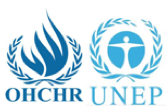The UN Office of the High Commissioner for Human Rights (OHCHR), together with the UN Environment Programme (UNEP), issued a briefing note on the meaning of the notion of universality in relation to the post-2015 development agenda.
 May 2015: The UN Office of the High Commissioner for Human Rights (OHCHR), together with the UN Environment Programme (UNEP), issued a briefing note on the meaning of the notion of universality in relation to the post-2015 development agenda.
May 2015: The UN Office of the High Commissioner for Human Rights (OHCHR), together with the UN Environment Programme (UNEP), issued a briefing note on the meaning of the notion of universality in relation to the post-2015 development agenda.
The authors compare practical application of the concept of universality across the international human rights, labor and environmental arenas. They outline the notion as having four aspects: recognition of universal principles, standards and values applicable to all countries and peoples; recognition of the interconnectedness of national and global development challenges; recognition that sustainable development challenges exist in all countries; and commitment to “leaving no one behind.” They note that the proposed Sustainable Development Goals (SDGs) reflect all four aspects.
The Note also distinguishes different responsibilities from different capacities, noting the need for a tailoring process to translate the global agenda to the national level. It suggests that stakeholder participation and dialogue can help foster national accountability for SDG commitments.
The note is published as UNEP Post 2015 Note #9. [Publication: Universality in the Post-2015 Sustainable Development Agenda] [UNEP Publications on Post-2015 Development Agenda] [OHCHR Briefing Note Series on Human Rights and the Post-2015 Development Agenda]